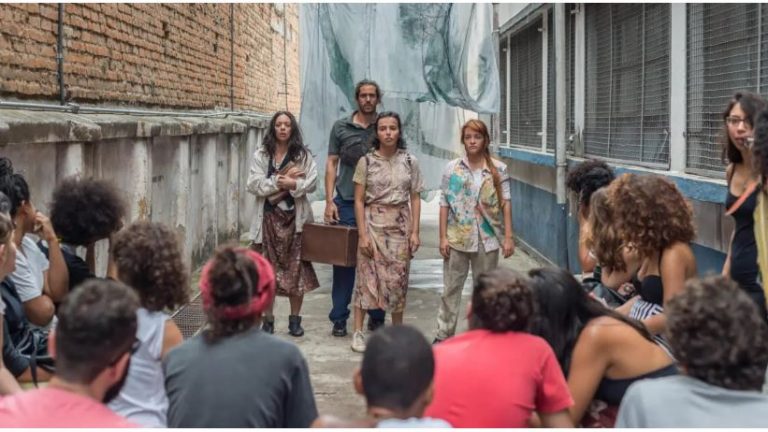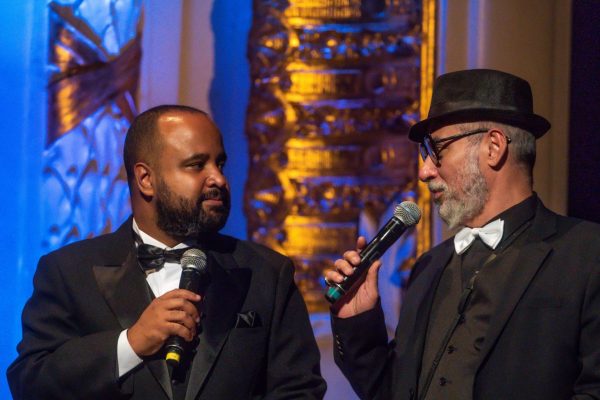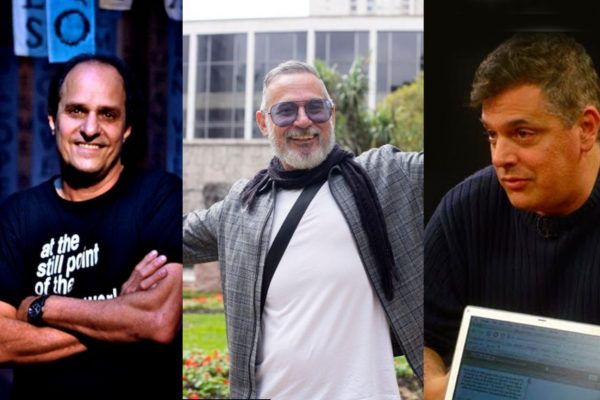Written by Ivam Cabral and Marcio Aquiles | 9th Feb 2023 | Brazil, Education, Essay, Poland, Theatre and Politics, Transcultural Collaborations
INTRODUCTION
São Paulo Theatre School was founded in 2009 with the aim to establish a democratic space and implement an innovative pedagogical system in agreement with the specific nature of the 21st century. In only a few years, it has become one of the most important educational institutions in Brazil, one which is recognized worldwide. Its pedagogical system, developed by important artists and pedagogues three years before the school’s foundation, has been an inspiration for important universities such as Stockholm University of the Arts (SKH), Theatre Academy (TeaK) at Uniarts Helsinki, and Zurich University of the Arts (ZHdK).
The institution currently has 372 regular students participating in eight different courses (acting, costumes and scenography, directing, dramaturgy, light design, mime, sound design, and stage management) and approximately 2000 extramural students who, every year, attend the workshops and programs provided by the school to develop their professional qualifications. The international exchange department has also facilitated more than a hundred foreign teachers and students from Bolivia, Cape Verde, Colombia, Cuba, England, Finland, Germany, Mozambique, Portugal, Sweden, Switzerland, and USA – among others – to come to teach and learn in São Paulo. In addition, Brazilian students and teachers have had access to equivalent opportunities in these same countries.
One of the branches of the São Paulo Theatre School, its headquarters, is located at Praça Roosevelt (a downtown area that used to be dominated by criminality, prostitution, and drug trafficking before its complete rehabilitation through the activities of local theatre companies as well as the São Paulo Theatre School). Another branch is in a historic building located in the Brás neighborhood.
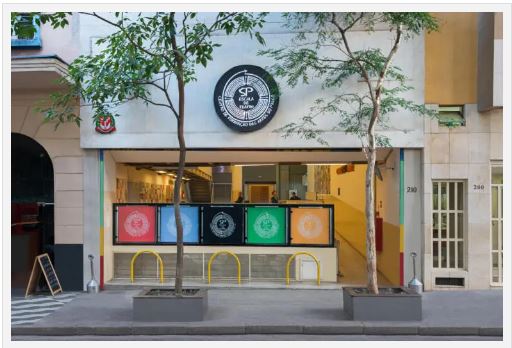
ACCESSIBILITY INSTEAD OF SOCIAL INCLUSION
One practical and epistemic proposition advanced by the São Paulo Theatre School is to replace the notion of social inclusion with accessibility. Following this principle, we avoid the objectification of the individual who, because of oppression or exclusion from available socioeconomic opportunities, could be forced into doing something due to external circumstances thus losing their autonomy and control over their own actions. On the contrary, accessibility means that everyone can have access to whatever they need to fulfill their aim, as long as equal opportunities are provided. As a result, the human being becomes an active subject that accesses territories instead of a passive object that is included within them.
Most of our students are young people from the slums and poor communities of the city of São Paulo, but thanks to the School´s considerable reputation, there are also students with PhDs or master’s degrees, who want to deepen their knowledge and especially from a practical perspective – everyone on the same level, respecting each other and leaning together.
With regard to society, our aim is to promote the philosophy that socially vulnerable people do not need to be included by external agents anywhere, however, they do need access to good educational programs, professionalization projects, and cultural exchanges with other people and places which do not discriminate against the so-called minorities a priori, so that everyone can come from and go to wherever they want and whenever they want to.
SOCIAL JUSTICE AND DECOLONIAL PERSPECTIVES
The São Paulo Theatre School was founded and started its activities on November 25, 2009. It also began with seven transsexual professionals hired onto the team, thus confirming their equal status long before issues of identity had received the recognition they have today. All the school’s activities are free. Nevertheless, 30% of the students have scholarships that serve as an income supplement for their families, as the majority of students come from socially vulnerable backgrounds.
DEIA concepts (diversity, equality, inclusion, and accessibility) are at the heart of our institution because we work from the perspective that plurality and otherness are understood as sources of energy and creative potential, elements that break anachronistic paradigms and provoke sociocultural transformations. At the São Paulo Theatre School, for instance, the students constantly deal with issues such as gendered identities and social empowerment, due to the institution’s historical connection with the transsexual and former marginalized community at Roosevelt Square.
The School also seeks to build new epistemologies based on decolonial perspectives. In this way, both the theoretical references used in the classes and the content of the library are guided by books and authors that present multiple points of view and enhance the empowerment of ethical and social groups that were previously silenced or ignored.
BASIS OF THE PEDAGOGICAL SYSTEM
As a main pedagogical goal, we plan to ensure our students have access to sophisticated techniques. The pedagogical system adopted at the São Paulo Theatre School is based on three pillars: Paulo Freire’s pedagogy of autonomy, Milton Santos’ concept of solidary territory, and Fritjof Capra’s systemic philosophy. These three axes guide the operation of everything at the school: the daily classes, the scenic experiments developed by the eight courses, and multifocal evaluations. In connection with the assessment, all the students evaluate themselves, each other, the creative nucleus to which they belong, their course, and the teachers themselves, who, in turn, do the same, resulting in a very democratic process.
It is expected that everyone learns with everyone else, and one learns by doing through investigation and activities involving scenic development. In this way, students with varying degrees of theatrical experience are placed side by side in all the activities. The pedagogy of the experience is what motivates the learning as students of all the aforementioned areas do everything: write the plays, build the sets and costumes, and create the lighting and sound design, all together, each according to their own courses.
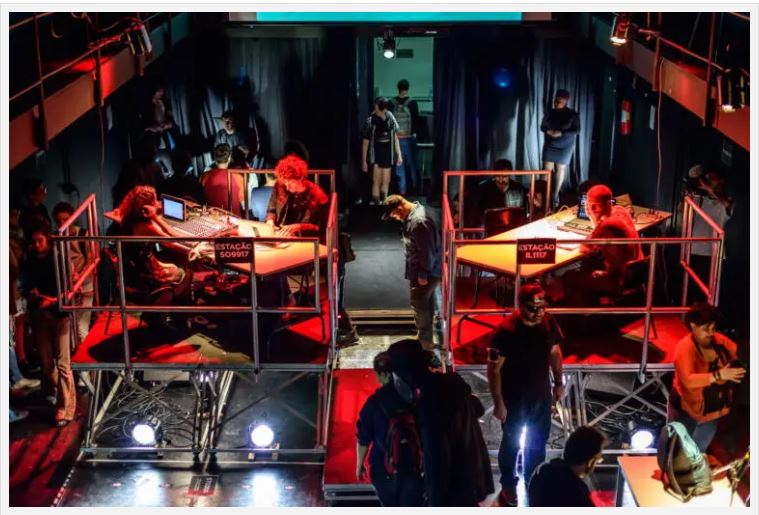
COOPERATION WITH TEACHERS FROM THE UNIVERSITY OF GDAŃSK
Professionals at the São Paulo Theatre School are always looking to take advantage of useful, fruitful, and strategic partnerships and collaborations with other artists and academics around the world. Upon learning of the interest of two researchers from the University of Gdańsk, Tomasz Wiśniewski and Martin Blaszk, to get to know our School in São Paulo, the executive director, and the international projects sector immediately started planning a workshop with them to be offered within the Extension Department – an intrinsically democratic sector, where vacancies are offered both to regular students and to those interested in the community, especially artists, students and those involved with arts.
It is important to mention that as a school with a systematic approach, everything must be connected with the guidelines discussed for the current semester, since all extension courses, although relatively independent, need to have some form of theoretical or thematic connection with the subjects studied in that period. In every semester unique working materials are worked with by teachers and students. In connection with ENTRE at the São Paulo Theatre School, this was done with great success, considering that one of the modules of the Technical Course, in which the performativity and poetics of the street are studied, topics that are convergent with the approaches that Wiśniewski and Blaszk proposed for their workshop.
In addition, it was a very propitious moment for the realization of such a course, since Teatro Oficina, one of the longest-running and most important theatre groups in Brazil, was staging Samuel Beckett’s “Waiting for Godot” at its premises – a cultural heritage site with historical significance. In turn, at Aliança Francesa, another theater also very close to Roosevelt Square, director Mika Linz was staging “Play,” a set of three short plays and a pantomime by the Irish playwright.
After deciding on the details of the workshop, “The Geography of Imagination: a collaborative Beckett,” applications were invited and the students were selected. The workshop proposed a mixture of a theoretical and a practical approach. At first, using the book Between Page and Stage – Scholars and Theatre-makers edited by Wiśniewski and Blaszk as a reference, Wiśniewski explained to the students how contemporary theatre depends neither on a logocentric model of communication derived from literature nor on the univocal artistic vision of the playwright, since theatre-makers have developed a variety of methods for this collective and multigeneous form of creative work, producing, thus, autonomous artistic paradigms that operate on multiple levels. Afterwards, Wiśniewski showed some examples of staging, pictures, and videos and then moved to a number of practical exercises, which were directed by Blaszk.
In the words of Heloísa Rocha, an acting student who participated in the workshop:
An exercise was proposed to be developed in pairs, and later presented to the other participants. Then, this same exercise was developed in two more steps, done with other pairs or trios. At the end, observing all these three phases, commenting and listening to the comments of other participants and teachers, I could see several possibilities of unfolding those exercises, and that from a creation made in twenty minutes, so I recognized how it is possible to elaborate and develop one or several concepts for a scene. I also noticed that there was an appreciation of the presence and exploration of body expression, this was encouraged and very well received, which relates to Beckett and his techniques of body exhaustion and the relationship between corporeality and subjectivation.
LOOKING TO THE FUTURE
The period of the pandemic was faced bravely by the School’s entire team: online classes were implemented, virtual festivals and new techniques through video conferencing apps were developed while, among other activities, books and articles were published by its educators. In 2022, we have had student exchanges in Germany and Brazil, teachers presenting our work in Finland, Lithuania, Norway, and Sweden, the production of new books, and the organization and participation at international conferences. At the moment, all departments of the São Paulo Theatre School are involved in the preparation for the Prague Quadrennial 2023. There’s a lot to be done and we’re ready for it.
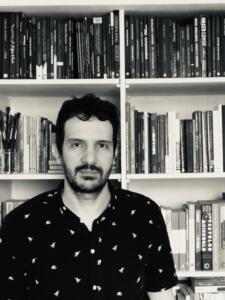 Marcio Aquiles. Photo by Renata Bonvino.
Marcio Aquiles. Photo by Renata Bonvino.
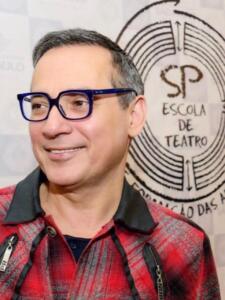 Ivam Cabral.
Ivam Cabral.
Fonte: The Theatre Times

